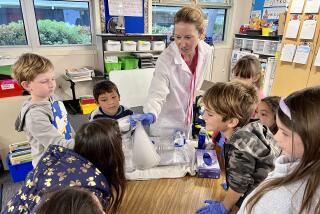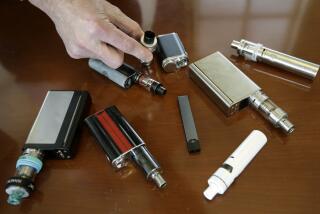Some Parents Think Science Projects Are for Students
- Share via
Since I know little about science, I sent my children to a science magnet school, hoping the teachers would pick up my slack.
The first year, all went well. My second-grader, Alex, “lost” all homework assignments that he didn’t want to do, so I was blissfully unaware that a science-fair project was required of every student, every year. By the next year, when my daughter Rebecca entered first grade, I had caught on.
The theme that year was water. I got out my 1963 edition of the World Book Encyclopedia, read the article on the water cycle and explained it to my daughter. She filled a poster board with crayon drawings of rain and oceans and arrows for evaporation.
In the same encyclopedia, Alex found a heat-expansion model made with a needle, thread and drinking straw that moved when you poured hot water into it. He got it to work, sort of. Both projects were thin on science, but sincere. I was unconcerned; these were elementary school children after all. The science fair was not competitive. There were no winners or losers, just participation ribbons for all.
Then I walked into the school auditorium and got a dose of George Orwell’s maxim: All science projects are equal, but some science projects are more equal than others. There were huge wooden boards covered with blinking lights, giant Styrofoam models of the solar system and, most of all, volcanoes: steaming, foaming volcanoes. Few people had paid attention to the water theme. The real object was to be big, colorful, dramatic. And, clearly, every scientist in the Los Angeles Unified School District sent their genius offspring to this school.
Chastened, I attended a parent-education meeting the following autumn titled: “Everything You Always Wanted to Know About Science Projects but Were Afraid to Ask.”
“I call them family projects,” the science lab teacher explained. “I have very high standards. This is one of my favorites.” She pointed to a 6-foot-tall welded metal-and-glass box she called a weather machine. “A second-grader made this with his father, who is an engineer.”
The fog lifted. Parents do the science projects. Children watch.
*
Why was I, and not my husband, stuck with this particular parenting chore? I quickly found out that science projects did not fall under what has come to be known in our marriage as the “dead rat” category. My husband does all the unpleasant tasks, such as taking out the garbage and disposing of the occasional dead rat. When he complains, I say, you take over science projects, and I’ll get rid of the dead rats. That is usually the end of the discussion.
Over the years, I managed to come up with enough science projects for my kids. As I learned at that parent-education night, there are two kinds: demonstrations and experiments. Demonstrations involve building contraptions that show a scientific phenomenon such as photosynthesis. Experiments entail coming up with a hypothesis and setting up an experiment to prove or disprove it. We have always done experiments.
One year, the theme was color. Rebecca and I developed a theory that darker crayons would absorb more heat than lighter-colored ones and, therefore, melt faster in the sun. We put the crayons on paper plates and placed them in the car to take advantage of the greenhouse effect. There seemed to be no relationship between color and melting time, but I did discover that it is impossible to remove an orange crayon that has rolled off the plate and melted into the upholstery.
Every year, I would go to the science fair and see more volcanoes. One, made of plaster of Paris, was bigger than my desk and painted to look like a real mountain. The volcano competition got so intense that the science lab teacher decreed that each student could only make one volcano during his or her elementary-school career.
*
Alex went on to middle school. I got a reprieve in the sixth grade, but, in seventh grade, he was assigned a science project. The students had to do research papers in addition to an experiment. And no family projects.
“What are we going to do this year, Mom?” Alex asked.
“That’s up to you,” I said.
He looked at me, dismayed, unbelieving. Coming up with science projects was my job. When he realized I wasn’t going to budge, he thought of a good idea: testing L.A. County drinking water for purity. I was off the hook. But, gradually, I found myself being pulled back in. I had the credit card, so I ordered the testing kit. I took him to the library to do the research and, ultimately, I drove him all over the county to get the water samples. We made a day of it. A 76 station in Marina del Rey, Marie Callender’s in Carson, Ralphs in Long Beach.
A few days later, Alex did the testing, for hardness, iron and chlorine. Oddly, none of the samples contained any chlorine. He called the Department of Water and Power and spoke to a scientist. Chlorine is a gas, he told Alex. It dissipates within hours of taking the water from the tap. Oh.
In the middle of all this, Rebecca reminded me that her science project was due in a week.
“You’re doing water testing,” I said.
“I want to do a volcano. This is my last year, and I’ve never done a volcano.”
She did water testing.
Last year as an eighth-grader, Alex had his science project idea before I knew what was happening. He wanted to test the conventional wisdom that school-cafeteria food is terrible.
The plan was to find out what was being served in the cafeteria, buy similar food at a grocery or fast-food store, have his classmates blind-taste it and say which they preferred. From the beginning, everything went wrong. The day Alex brought fried chicken, the cafeteria served barbecued chicken. He brought burritos another day, but the cafeteria offered tacos. Then the principal heard about the experiment and, apparently, really wanted to know whether his students hated cafeteria food. All of a sudden, no due date. The cafeteria staff would personally inform Alex what was being served and prepare him a tray. It was a real-life, last-minute save.
Alex graduated from middle school, but Rebecca still has her seventh- and eighth-grade projects ahead of her. Now, my biggest fear is high school. Are there science projects in high school? Don’t tell me. I don’t want to know.
More to Read
Sign up for Essential California
The most important California stories and recommendations in your inbox every morning.
You may occasionally receive promotional content from the Los Angeles Times.













